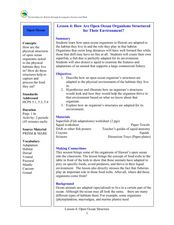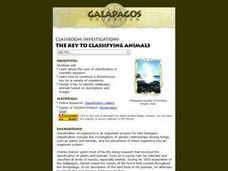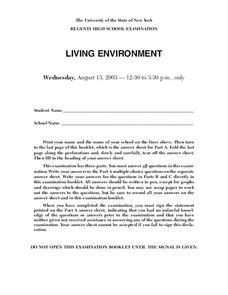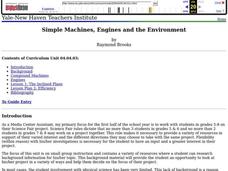Polar Trec
Animal Monitoring Introduction
Not only do mealworms taste great, they are also great for classroom science lessons. In pairs, young scientists observe and record what they see as they check out what their mealworms are doing from minute to minute. Each minute...
Florida Department of Environmental Protection
Water's Journey Expedition
Step into a scientist's shoes to go online and discover the Florida Springs Expedition, and participate in two activities focusing on how humans impact the environment. The first activity asks scholars to summarize the six...
New York State Department of Environmental Conservation
Adaptations – Designs for Survival
What's the difference between behavioral adaptations and physical adaptations? Learn about the various ways that organisms adapt to their environment with a worksheet about the creatures of the Hudson River.
Curated OER
Animal Skin
Students investigate the skin surface to body area ratios for different animals. In this seventh/eighth grade mathematics/science lesson, students explore heat transfer between an animal’s body and the environment. Using...
Curated OER
Create a New Animal
Students understand what physical adaptations are and how they help an animal to survive. In this adaptations lesson, students research four animals and then make an original animal that has adaptations to make them survive.
Curated OER
Follow Those Tracks
Students observe a picture containing patterns of animal tracks, infer what might have happened based upon the pattern of tracks, and write a story describing what might have happened.
Curated OER
Animal Morphs
Learners explore animal drawing. In this cross curriculum drawing, photography, and animals instructional activity, students combine computer drawing and freehand drawing to create an animal and its environment using a...
Curated OER
Teaching Kids about the Environment
Fifth graders identify the species of plants and animals found in an environment. They compare these findings to plant and animal species found in an unlike environment. Students acquire and compare soil samples from the two sites chosen.
Curated OER
How Are Open Ocean Organisms Structured for Their Environment?
Students explore biology by conducting an animal dissection. In this oceanography lesson, students identify the life cycle of a squid and other animals that are involved with commercial fishing. Students dissect a squid in class and...
Curated OER
My Favorite Animal and Me
Students research their favorite animal. They create their own fact book to share about their animal and their habitat.
Curated OER
Animal Adaptations
Students use items from boxes to dress up classmates as animals adapted to a given environment.
Curated OER
Animal Behavior
For this animal behavior worksheet, learners will read information about reflex behaviors and instinct behaviors. Then students will complete 1 short answer and 1 fill in the blank question.
Curated OER
The Key To Classifying Animals
Explorers of the environment construct a dichotomous key for a variety of organisms and design a key to classify Galapagos animals based on descriptions and images. The lesson includes a link to an animal gallery and the worksheet for...
Curated OER
Build a Hawaiian Bird
Fifth graders make a model of a bird. In this animal adaptations lesson, 5th graders examine how birds adapt to their environment, using Hawaiian birds as an example. Students create their own bird using adaptation paper cut outs...
Curated OER
Living Environment
In this environmental instructional activity students complete a series of multiple choice and short answer questions on animal populations, cell structure and chromosomes.
Curated OER
Plants and Animals in the Local Environment
In this plant and animal environment worksheet, students draw 3 animals or plants in each circle to identify which habitat they belong to: air, land, or water.
Curated OER
Animal Brochures
Fourth graders work in pairs to research an animal. They fill in an animal data form in order to become experts about the animal they choose. They use the listed criteria to design a six sided brochure that includes graphics of the...
Curated OER
Horseshoe Crab Fun
Marine biology masters will meet the horseshoe crab and red knot shore birds that feast upon the crab eggs. Begin with a discussion and then have learners write postcards from each animal detailing their migration trips. A few math...
Curated OER
Animal Adaptations
Tenth graders participate in an arthropod scavenger hunt. In groups of two, they identify and collect two specimens of arthropods in the school area, and create a table of all the specimens and what class they belong to.
Curated OER
Teaching Animal Rights
In this biology worksheet, students engage in the reading of the rights of educators to teach concerning the issue of using animals for educational purposes.
Curated OER
How Organisms Live Successfully in Their Environments
Students compare the climate and organisms found in different environments, then give examples of how plants and animals adapt to their environment. They design an animal who adapts using camouflage to a made-up environment.
Curated OER
Living Environment
For this environment worksheet students complete a series of multiple choice questions and short answers on plant and animal species and populations in an ecosystem.
Curated OER
Simple Machines, Engines and the Environment
Fourth graders calculate the mechanical advantage of an inclined plane. In this physics instructional activity, 4th graders identify the different types of simple machines and their uses. They give examples of compound machines.
Curated OER
Sea Animal Slide Show
Students cllassify sea animals into groups based on certain attributes. They create a picture on ClarisWorks for Kids. They write/wordprocess their own name and copy words from immediate environment to label sea animals.

























